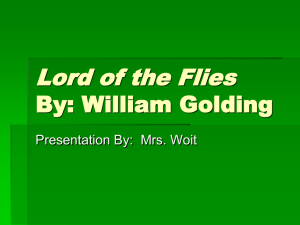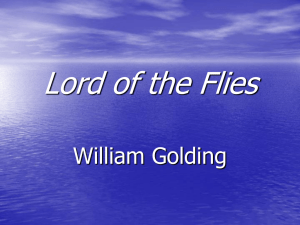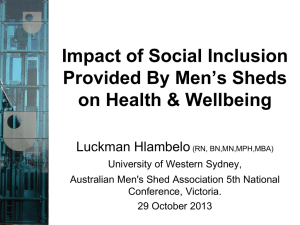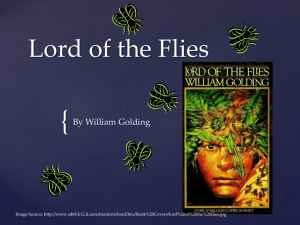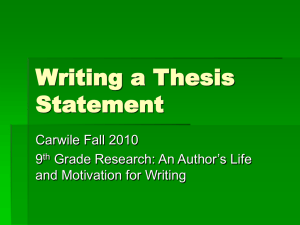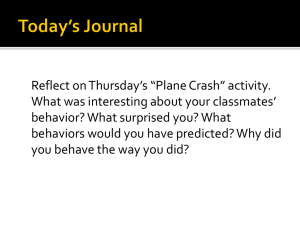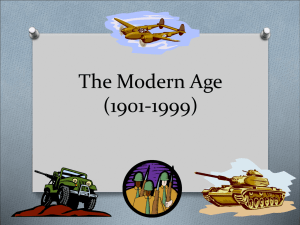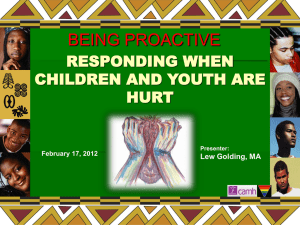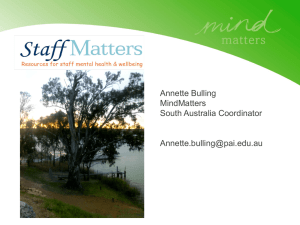Men`s Learning and Wellbeing Research to October 2012
advertisement
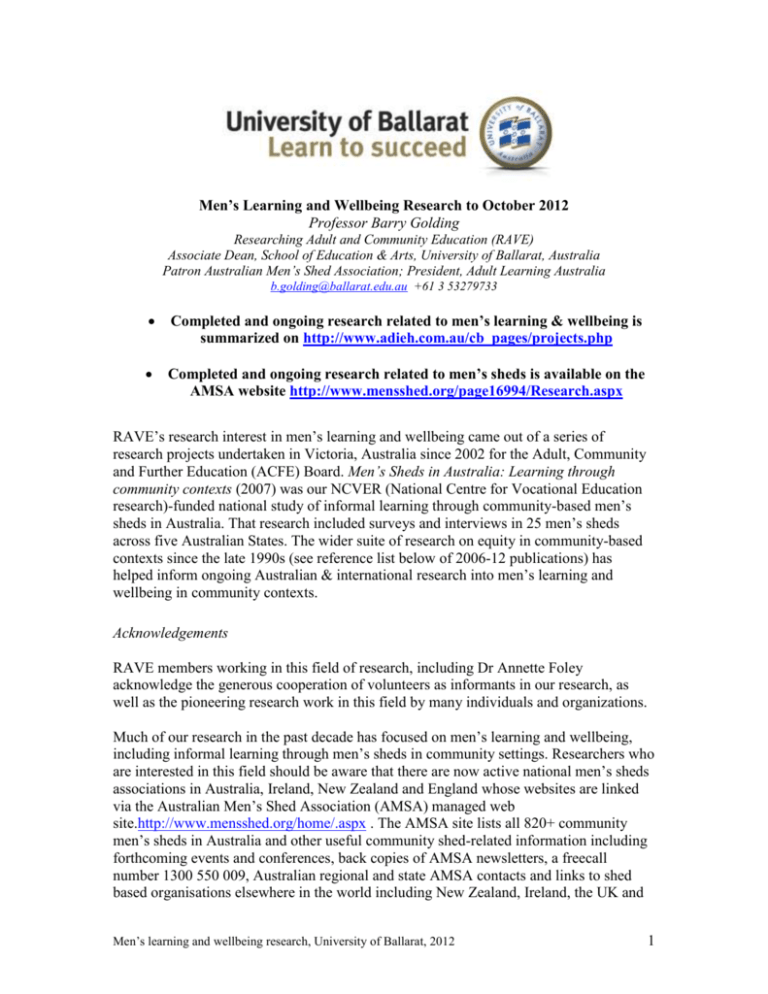
Men’s Learning and Wellbeing Research to October 2012 Professor Barry Golding Researching Adult and Community Education (RAVE) Associate Dean, School of Education & Arts, University of Ballarat, Australia Patron Australian Men’s Shed Association; President, Adult Learning Australia b.golding@ballarat.edu.au +61 3 53279733 Completed and ongoing research related to men’s learning & wellbeing is summarized on http://www.adieh.com.au/cb_pages/projects.php Completed and ongoing research related to men’s sheds is available on the AMSA website http://www.mensshed.org/page16994/Research.aspx RAVE’s research interest in men’s learning and wellbeing came out of a series of research projects undertaken in Victoria, Australia since 2002 for the Adult, Community and Further Education (ACFE) Board. Men’s Sheds in Australia: Learning through community contexts (2007) was our NCVER (National Centre for Vocational Education research)-funded national study of informal learning through community-based men’s sheds in Australia. That research included surveys and interviews in 25 men’s sheds across five Australian States. The wider suite of research on equity in community-based contexts since the late 1990s (see reference list below of 2006-12 publications) has helped inform ongoing Australian & international research into men’s learning and wellbeing in community contexts. Acknowledgements RAVE members working in this field of research, including Dr Annette Foley acknowledge the generous cooperation of volunteers as informants in our research, as well as the pioneering research work in this field by many individuals and organizations. Much of our research in the past decade has focused on men’s learning and wellbeing, including informal learning through men’s sheds in community settings. Researchers who are interested in this field should be aware that there are now active national men’s sheds associations in Australia, Ireland, New Zealand and England whose websites are linked via the Australian Men’s Shed Association (AMSA) managed web site.http://www.mensshed.org/home/.aspx . The AMSA site lists all 820+ community men’s sheds in Australia and other useful community shed-related information including forthcoming events and conferences, back copies of AMSA newsletters, a freecall number 1300 550 009, Australian regional and state AMSA contacts and links to shed based organisations elsewhere in the world including New Zealand, Ireland, the UK and Men’s learning and wellbeing research, University of Ballarat, 2012 1 Canada. David Helmers amsa@mensshed.net is the 2012 AMSA Executive Officer . Community shed-based organisations can check, update and supply their organisation details on the free, community-based shed web site www.mensshed.org. AMSA membership is open to all sheds. Based on experiences of many shed start-ups, an AMSA-supported manual is available on Setting up a Men's Shed. The price is A$25 (+$10 p&p) available from AMSA. Also see the many links on Men’s Shed Online, launched in Dec 2010. http://www.theshedonline.org.au/about The first National (Australian) Men’s Shed Conference was in 2005 in Lakes Entrance, Victoria; the second in Manly (Sydney, New South Wales) in 2007 and the third in Hobart, Tasmania in August 2009. The 2011 AMSA Conference was held in Brisbane, Queensland 21-23 August with 360 participants. By mid 2012 there were over 700 men’s shed organisations across all states and territories of Australia, with around 30 also in New Zealand and over 60 in Ireland, with Men’s Sheds projects also being funded through Age UK in England and at least two sheds open in Canada. At the 2011 Australian Conference a decision was made to set up an International Federation of Men’s Sheds Association. The 2013 Australian conference will be in Ballarat in late October. In 2008/9 the Victorian State government in Australia announced government grants through the Department of Planning and Community Development for many new sheds in Victoria: the first government in the world to provide specific support (A$4 million over four years) directly to community-based men’s sheds. The Victorian Governor, Professor David de Kretzer is the Victorian Men’s Sheds Association Patron. The Australian Men’s Health Policy Strategy has identified men’s sheds as an important community health innovation, and Adult Learning Australia regards them as an important national innovation in informal learning for men. During 2010 the Australian Government provided four years of funding (A$3.3 million) through the Department of Health and Ageing for the national coordination of sheds through the Australian Men’s Sheds Association. The first 20 men’s sheds received federal funding in Feb 2011. Our research report Men’s sheds in Australia: learning through community contexts, (2007, NCVER) and the ‘Supporting documents’ are available free for download www.ncver.edu.au/publications/1780.html). While the emphasis in this community shedbased research has mainly been on the informal learning function of sheds, it provides a carefully researched profile of the range of men who participate, for what sorts of reasons and what they are getting out of it. The demonstrable outcomes include health, happiness and wellbeing as well as informal learning. Our research report has already been useful to shed-based organizations, governments and auspice organizations that plan, mentor, auspice and support men’s sheds in community contexts. Our aim in 2011-12 is to progressively extend some of our research and findings to other organisations, communities and nations where learning and wellbeing are recognised as a problem for some men, particularly for men not in paid work, and where the wellbeing value of informal, community-based lifelong and lifewide learning is sometimes not recognised or valued. In Ireland the research includes the many Irish Men’s sheds. Our major project in 2012-13 is assembling a book to be edited by Barry Golding, Rob Mark and Annette Foley published by NIACE early in 2014 called Men learning through life. Men’s learning and wellbeing research, University of Ballarat, 2012 2 Our national and international research to 2012 ‘Men’s learning and wellbeing: Beyond the workplace’ This research into men’s learning through informal community contexts is one of the outcomes of our Australian research into men’s learning and community men’s sheds. The research is considered timely and of interest in 2012 to nations experiencing one or more of the following: Concerns about men’s attitudes to and involvement in formal, lifelong, community and adult learning The inadequacy of current research and policy in this field Concerns about wellbeing and health for the growing proportion of men not involved in the paid workforce (unemployed, working voluntarily, retired or with a disability). Pessimism about the value of formal training for re-integrating older and displaced men into the workforce, with downturns in the global economy. Ageing of the population and the need for more men to keep actively engaged in lifewide learning for diverse purposes. Informal learning contexts and organizations we are particularly interested in Adult and community education Volunteer fire and emergency services Sporting Religious or culturally diverse / Indigenous Disability, age-related and institutional Men’s social and special interest organizations (such as men’s sheds, fishing and hunting clubs). Research questions that are guiding our international research What shapes men’s attitudes towards the learning beyond the workplace? How does men’s learning capacity and aptitude to learn change with age? How are these attitudes affected by location, class, culture and men’s different masculinities? Which informal, group learning environments, contexts and community organizations engage men not involved in paid work, for what reasons and with what outcomes? What is the relationship between informal group affiliation and learning in community contexts, and the wellbeing of men, their families and communities? What learning roles do different types of community organization play and what are the preferred pedagogies (ways of learning)? What can be done to positively re-engage other men in learning through community engagement? Men’s learning and wellbeing research, University of Ballarat, 2012 3 Research Plans for 2010-12 While this research originated in Australia it is becoming increasingly international. During 2010 visits and meetings took place with researchers in from several European Union nations (Greece, Portugal and three Nordic countries: Denmark, Finland and Sweden and Ireland) as well as in the Australia, UK and New Zealand to investigate whether there is interest in research collaboration to create new research teams and sites to inform the research. In 2011 other researchers and sites have joined in the Pacific region as well as in Europe. Research sites visited during 2011 included Samoa & New Zealand (July 2011) as well as Finland, Ireland, Scotland, England, Portugal and Greece (Sept & Oct 2011). In 2012 research reconnaissance was undertaken in China and new research partnerships have been forged with both Anshan Normal University (Anshan) and East China Normal University (Shanghai). Researchers contributing to the research in 2012: Key national acedmic contacts in bold. Australia: Professor Barry Golding b.golding@ballarat.edu.au Dr Annette Foley a.foley@ballarat.edu.au; Dr Aijing Jin a.jin@ballarat.edu.au and Barry Golding are visiting China in June 2012. Ireland: John Evoy, johnevoy@cowexfordVEC.ie Waterford. John is AMSA representative in Europe as well as the Caretaker of the Irish Men’s Shed Association; Dr Lucia Carragher lucia.carragher@netwellcentre.org, Netwell Centre, Dundalk Institute of Technology, Ireland. Finland: Arja Mielonen-Walker arja.mielonen-walker@helsinki.fi Palmenia Centre for Continuing Education, University of Helsinki. England: Jim Soulsby jim.soulsby@btinternet.com Leicester & Dr Peter Lavender drprslavender@yahoo.co.uk NIACE, Leicester; Harvinder Channa Harvinder.Channa@ageuk.org.uk Age UK, London. Scotland: Dr Rob Mark rob.mark@strath.ac.uk University of Strathclyde, Glasgow. Greece: Assistant Prof George Zarifis gzarifis@edlit.auth.gr Aristotle University of Thessaloniki. Portugal: António Fragoso ESEC (Escola Superior de Educação e Comunicação) Universidade do Algarve, Campus da Penha, Faro, Portugal aalmeida@ualg.pt New Zealand: Prof Brian Findsen bfindsen@waikato.ac.nz and University of Waikato, Hamilton & Dr Neil Bruce.nb001_wave@ihug.co.nz Hamilton. China: 1. Prof. Tingyan Zhao, Dean of the School of Social Development, Anshan Normal University, Anshan zhaotingyan2004@163.com (English language contact via Cui Xu (Robin) anudiec@hotmail.com, Program Coordinator, Dept. of International Exchange and Cooperation, Anshan Normal University); 2. Dr Jennifer Jinfei Lu, School of Public Administration, East China Normal University, Shanghai jflu@sem.ecnu.edu.cn. Men’s learning and wellbeing research, University of Ballarat, 2012 4 If you are interested in joining this network, please contact Barry Golding b.golding@ballarat.edu.au Barry Golding’s University of Ballarat RAVE research, primarily about men’s learning 2006 to October 2012 2006 Golding, B. (2006) ‘A profile of men’s sheds in Australia: Patterns, purposes, profiles and experiences of participants: Some implications for VET & ACE about engaging older men’, Refereed Paper to AVETRA Conference, Wollongong. Hayes, C., Golding, B. & Harvey, J. (2006) ‘Finding the fire: Numeracy and literacy for public safety volunteers’, Refereed Paper to Joint Conference of Australian Council for Adult Literacy (ACAL) and Adults Learning Mathematics (ALM) Group. 2007 Golding, B., Brown M. & Foley, A. (2007) ‘Old dogs, new shed tricks: An exploration of innovative workshop-based practice for older men in Australia’, , Refereed Paper to AVETRA Conference, 11-13 April, Melbourne, Victoria. Golding, B., Brown, M., Foley, A., Harvey, J. & Gleeson, L., Men’s sheds in Australia: Learning through community contexts, NCVER, Adelaide, South Australia. www.ncver.edu.au/publications/1780.html Golding, B. (2007) ‘Social, local and situated: evidence and insights from Australian research into the effectiveness of older men’s learning in community contexts’, B. Golding, Paper to Second Nordic Conference on Adult Learning, 17-19 April, Lingkoping University, Sweden. Golding, B. (2007) ‘Researching men’s sheds in community contexts in Australia: What does it tell us about education for older men?’, Paper CASAE-ACEEA, Mount St Vincent University, 6-9 June, Halifax, Nova Scotia, Canada. Golding, B. (2007) ‘Older men’s lifelong learning: Common threads/sheds’, Paper to CRLL Conference, 22-24 June 2007, University of Stirling, Scotland. (2009 Book Chapter) Golding, B., Foley, A., & Brown, M. (2007) ‘Shedding some new light on gender: Evidence about informal learning preferences from Australian men’s sheds in community contexts’, Paper to SCUTREA Conference, 3-5 July, The Queen’s University of Belfast, Ireland. Golding, B., Foley, A. & Brown, M. (2007) ‘The international potential for men’s shed based learning’, Ad Lib, Journal of Continuing Liberal Adult Education, University of Cambridge, Issue 34, December, pp.9-13. 2008 Golding, B., Kimberley, H., Foley, A. & Brown, M. (2008) ‘Houses and sheds: An exploration of the genesis and growth of neighborhood houses and men’s sheds in community settings’, Australian Journal of Adult Learning, 48: 2, pp.237-262. Vallance, P. & Golding, B. (2008) ‘‘They’re funny bloody cattle’: Encouraging rural men to learn’, Australian Journal of Adult Learning, 48:2, pp.369-384, Reflection. ,Golding, B., Foley A., & Brown, M (2008) ‘Shedding school early: Insights from school & community shed collaboration in Australia’, Refereed Paper to AVETRA Conference, Adelaide, 3-4 April. Men’s learning and wellbeing research, University of Ballarat, 2012 5 Foley, A., Golding, B. & Brown, M. (2008) ‘Let the men speak: Health, friendship, community and shed therapy’ Refereed Paper to AVETRA Conference, Adelaide, South Australia, 3-4 April. Golding, B. (2008) ‘Researching men’s sheds in community contexts in Australia: What does it suggest about adult education for older men?’, Journal of Adult and Continuing Education, 14 (1) Spring, pp.17-33. Golding, B. (2008) ‘Learning by men not in work: A review of research’, Refereed Paper to (in Proceedings of) Fifth International Lifelong Learning Conference, Yeppoon, Queensland, 17-19 June. Golding, B. & Foley, A. (2008) ‘How men are worked with: Gender roles in men’s informal learning’, Refereed Paper to SCUTREA Conference, University of Edinburgh, Scotland, 2-4 July. Golding, B. (2008) ‘Common wealth through community men’s sheds: Lives and learning networks beyond work’, Paper to Pan Commonwealth Forum on Open Learning, University of London, England, 14-17 July, 2008. ‘Out the back: Men’s sheds and informal learning’, M. Brown, B. Golding & A. Foley, Fine Print 31(2) pp.12-15, 2008. Golding, B (2008) ‘Learning by men not in work: A review of research’, in D. Orr, P. Danaher, G. Danaher & R. Harreveld (Eds.), Lifelong learning: Reflecting on success and framing futures (pp.176-181), Central Queensland University Rockhampton, Queensland. 2009 Golding, B., Brown, M. & Foley, A. (2009) ‘Informal learning: A discussion around defining and researching its depth and breadth’, , Australian Journal of Adult Learning, 49 (1) April, pp.34-56. Golding, B. (2009) ‘Older men’s lifelong learning: common threads/sheds’, in J. Field, J. Gallagher & R. Ingram, Researching transitions in lifelong learning, Milton Park, Routledge, pp.65-75. Golding, B., Foley, A. & Brown,, M. (2009) ‘Shifting the locus/ts: Evidence and insights into academic power and knowledge from recent Australian adult, vocational and community education research’ Paper to AVETRA Conference, Sydney 16-17 April. Golding, B., Foley, A., Brown, M. & Harvey, J (2009) Senior men’s learning and wellbeing through community participation in Australia, Report to National Seniors Productive Ageing Centre, University of Ballarat, October,. http://archimedes.ballarat.edu.au:8080/vital/access/HandleResolver/1959.17/16450 or http://www.productiveageing.com.au/site/publications.php Golding, B., Brown, M., Foley, A. & Harvey, J. (2009) Men’s Learning and wellbeing through community organisations in Western Australia, B. Golding, M. Brown, A. Foley & J. Harvey, Report to the Western Australia Department of Education and Training, University of Ballarat, October, http://archimedes.ballarat.edu.au:8080/vital/access/HandleResolver/1959.17/16443 2010 Golding, B., Foley, A., Brown, M. & Harvey, J. (2010) ‘Making good connections: How community participation enriches learning, wellbeing and a sense of identity in older men’, Report based on 2009 NSPAC study by by E. Skladzien & S. O’Dwyer, National Seniors Australia Productive Ageing Centre, Canberra, Feb. http://archimedes.ballarat.edu.au:8080/vital/access/HandleResolver/1959.17/16465 Mark, R., Montgomery, V. & Graham, H. (2010) ‘Beyond the workplace: An investigation into older men’s learning and wellbeing in Northern Ireland’, Report for the Men’s learning and wellbeing research, University of Ballarat, 2012 6 Changing Ageing Partnership (CAP), Queen’s University Belfast, http://archimedes.ballarat.edu.au:8080/vital/access/HandleResolver/1959.17/16457 Golding, B. (2010) ‘Drying and perceptions of climate change: Insights from a Riverina site in the Southern Murray-Darling Basin’, B. Golding, Paper No. 35 to AVETRA Conference, 8-9 April, Gold Coast, Queensland. Golding, B. (2010) ‘Learning at the end of the rainbow: A study of community learning availability & outcomes for older men in an Australian regional community’, Paper No. 36 to AVETRA Conference, 8-9 April, Gold Coast, Queensland, Australia. Golding, B. (2010) ‘The big picture on men’s (and boy’s) learning’, April, Australian Journal of Adult Learning 50:1, pp.54-74. Golding, B. (2010) ‘Men learning about communication and wellbeing through community involvement: Evidence from an empirical Australian study’, Paper to Conference of the European Society for Research into the Education of Adults (ESREA), 23-26 Sept, Linkoping, Sweden. Golding, B. (2010) ‘What learning experiences and outcomes are valued by older men in Australia?’ Paper to Conference of the European Society for Research into the Education of Adults (ESREA) Network on Education and Learning of Older Adults (ELOA), 7-9 Oct, Munich, Germany Golding, B. (2010) ‘What factors influence older men’s learning and wellbeing through community organisations in Australia?’, Paper to Conference of the European Society for Research into the Education of Adults (ESREA) Network on Education and Learning of Older Adults (ELOA), 7-9 Oct, Munich, Germany. Morgan, S. & Golding, B. (2010) ‘Crossing over: Collaborative cross-cultural teaching of Indigenous education in a higher education context’, Australian Journal of Indigenous Education 39S: pp.8-14. 2011 Golding, B. (2011) ‘Social, local, and situated: Recent findings about the effectiveness of older men’s informal learning in community contexts’, Adult Education Quarterly 61:2, pp.102-120. Golding, B. (2011) ‘Men’s informal learning and wellbeing beyond the workplace’, Book Chapter in Innovations in Lifelong Learning, (ed. Sue Jackson), Birkbeck Institute, University of London, pp.67-86. Golding, B. (2011) ‘Not just petrol heads: Men’s learning in the community through participation in motor sports’, European Journal of Adult Learning, pp.116.http://www.rela.ep.liu.se/current_issue.html Golding, B. (2011) ‘Thinking inside the box: What can we learn from the men’s shed movement?’ Adults Learning 22: 8, pp.24-27. Golding, B. & Foley, A. (2011) ‘Do you want VET with that? Some implications for lifelong and lifewide learning in an era of universal VET’, Refereed Paper No. 29 to AVETRA Conference, 28-29 April, Melbourne. http://avetra.org.au/publications/conference-archives/conference-archives-2011/2011conference-papers Golding, B. (2011) ‘Older men’s wellbeing through community participation in Australia’, International Journal of Men’s Health, Vol. 10, No. 1, 26-44. Golding, B. (2011) ‘Older men’s learning through age-related community organisations in Australia’, International Journal of Education and Ageing, Vol. 1, No.3, May, pp.237252. Men’s learning and wellbeing research, University of Ballarat, 2012 7 Golding, B. (2011) ‘Shedding ideas about older men’s learning’, Lifelong Learning in Europe, 2, pp.119-124. Golding, B. (2011) ‘Taking charge at any age: Learning and wellbeing by older men through community organisations in Australia’, Adult Learner 2011: The Irish Journal of Adult and Community Education, pp.26-40. Golding, B. & Foley, A. (2011) ‘All over red rover? The neglect and potential of Australian adult education in the community’, Australian Journal of Adult Learning 51, Special Edition, December, pp.53-71 2012 (to October) Golding, B., Angus, L., Foley, A. & Lavender, P. (2012) ‘Learner voice in VET and ACE: What do stakeholders say?’ Refereed Paper 78 to 15th Annual AVETRA Conference, Sydney, 12 April. Golding, B., Lavender, P., Angus, L. & Foley, A. (2012) Closing the loop: Listening and responding to learner voice in vocational education and training in Australia, Report to National VET Equity Advisory Council (NVEAC), University of Ballarat, Ballarat. Golding, B. (2012) ‘Men’s sheds, community learning and public policy’, Chapter 10 in Bowl, M., Tobias, R., Leahy, J., Ferguson, G. & Gage, J. Gender, masculinities and lifelong learning, Routledge, Abingdon, pp.122-133. Golding, B. (2012) ‘Men’s learning through community organisations: Evidence from an Australian study’, Chapter 11 in Bowl, M., Tobias, R., Leahy, J., Ferguson, G. & Gage, J. Gender, masculinities and lifelong learning, Routledge, Abingdon, pp.134-146. Mark, R. & Golding, B. (2012, forthcoming) ‘Fostering social policies that encourage engagement of older men in their own learning: Challenges for improving the health and wellbeing of men in the third age’, International Journal of Education and Ageing Angus, L. Golding, B., Foley, A. & Lavender, P. (2012) ‘Learner voice”: Who speaks? Who listens?’ Paper to European Conference on Education Research, Cadiz, Spain, 17-21 Sept. Also available on line 2012 A list of research that informs men’s shed-based practice (including all international shed-related research reported to early 2012: if there are omissions or additions, please please let Barry Golding know) in the AMSA website. http://www.mensshed.org/page16994/Research.aspx The NCVER VOCED Data Base lists most of Barry Golding’s other research. See http://www.voced.edu.au (type ‘Golding’ into ‘the terms’ box). Listen to interviews about the (2009) 'Men's learning' and 'Learning to be drier' research projects on http://www.ala.asn.au/Learning_Works.aspx Researching Adult & Vocational Education (RAVE) Group research: See http://www.ballarat.edu.au/ard/education/research/rave.shtml Downloadable NCVER research reports about community-based learning involving Barry Golding, 1998-2008 Vocational education and training for people from non-English speaking backgrounds, V Volkoff and B Golding, NCVER, 1998. http://www.ncver.edu.au/publications/187.html Men’s learning and wellbeing research, University of Ballarat, 2012 8 The vocational essence of ACE: The delivery of VET programs by community education providers, V Volkoff, B Golding & J Jenkin, NCVER, 1999. .http://www.ncver.edu.au/publications/345.html A consolidation of ACE research 1990-2000: Review of research, NCVER, B Golding, M Davies & V Volkoff, 2001. http://www.ncver.edu.au/publications/638.html Adult learning through fire and emergency services organizations in small and remote Australian towns, C Hayes, B Golding & J Harvey, NCVER, 2004. http://www.ncver.edu.au/publications/1497.html ‘Who’s doing the hunting and gathering: an exploration of gender segmentation of adult learning in small and remote communities’, B. Golding and ‘Inequity in Australian vocational education and training’, B. Golding & S. Pattison, in Equity in vocational education and training: Research readings, (Ed K. Bowman), NCVER, 2004, p.225-242 and pp.108-119, 2004. http://www.ncver.edu.au/publications/1389.html Learning through Indigenous business: The role of vocational education and training in Indigenous enterprise and community development, K. Flamsteed & B. Golding, 2005. http://www.ncver.edu.au/publications/1572.html Men’s sheds in Australia: Learning through community contexts. B. Golding, M. Brown, A Foley, J Harvey & L Gleeson, 2007. http://www.ncver.edu.au/publications/1780.html Creating learning spaces for refuges: The role of multicultural organizations in Australia, B. Miralles-Lombardo, J. Miralles & B. Golding, 2008. http://www.ncver.edu.au/publications/1964.html Men’s learning and wellbeing research, University of Ballarat, 2012 9
